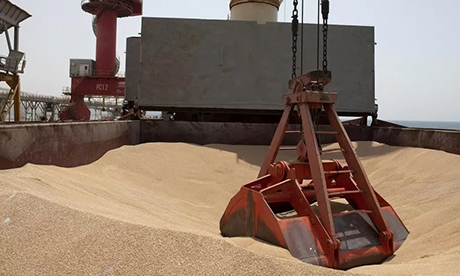An agreement allowing shipments of grain to flow from Ukraine through the Black Sea to developing countries has been extended, officials said on Saturday.
The agreement was first signed with the United Nations and Turkey in July last year, following a halt to shipping and fears of a global food crisis after Russia invaded Ukraine.
The deal’s renewal allows food shipments from three Black Sea ports.
According to the UN, the deal has allowed nearly 25 million tonnes of foodstuffs from Ukraine’s Black Sea ports to reach global markets.
Due to expire within hours, the deal was extended, though neither the UN nor Turkish President Recep Tayyip Erdogan confirmed how long the extension would last.
The UN, Turkey and Ukraine pushed for 120 days, but Russia would agree to only 60 days.
Ukrainian Deputy Prime Minister Oleksandr Kubrakov tweeted on Saturday that the deal would remain in effect for the longer, four-month period. However, Russia’s Foreign Ministry spokeswoman Maria Zakharova told Tass that Moscow “agreed to extend the deal for 60 days”.
Russia has warned it will not allow the deal to be extended unless sanctions against Moscow are softened.
Russia and Ukraine are significant global suppliers of wheat, barley, sunflower oil and other affordable food products that developing nations rely on.
60-day deal disappoints
The International Rescue Committee expressed disappointment that the deal is for 60 days only. They said that East African countries, including Somalia, which receives over 90% of its grain from Ukraine, will be entering the lean grain season at the time of its expiration in May.
The war in Ukraine caused food prices to soar to record highs last year, contributing to a global food crisis tied to the effects of the COVID-19 pandemic and climate factors like drought.
The disruption in shipments of grain needed for staples of diets in places like Egypt, Lebanon and Nigeria exacerbated economic challenges. It pushed millions more people into poverty or food insecurity.
In the past few months, inspections meant to ensure ships carry grain only and not weapons have slowed down deliveries significantly. This led to backlogs in vessels waiting in the waters of Turkey and a drop in the amount of grain getting out of Ukraine.
While grain shipments from Ukraine have been delayed, Russia has exported huge amounts of wheat after a record crop. Figures from financial data provider Refinitiv showed that Russian wheat exports more than doubled to 3.8 million tons in January from the same month a year ago, before the invasion.
Russian wheat shipments were at or near record highs in November, December and January, increasing 24% over the same three months a year earlier, according to Refinitiv. It estimated Russia will export 44 million tons of wheat in 2022-2023.
Sources
